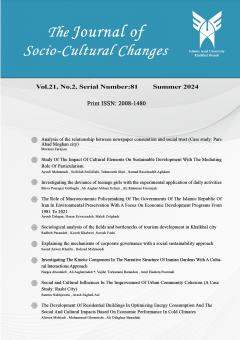Exploring The Role Of Artificial Intelligence In Blended Learning For Improving Social Interactions Among Primary Students: A Case Study Of Tuyserkan
Subject Areas : Social EvolutionsAmir Hossein Souri 1 , Farideh Goudarzi 2 *
1 - Department of Educational Sciences, Malayer Branch, Islamic Azad University, Malayer, Iran.
2 - Department of Educational Sciences, Malayer Branch, Islamic Azad University, Malayer, Iran.
Keywords: Education, Societal Development, AI, Social Interactions, Cultural Identity, Students, Tuyserkan.,
Abstract :
Education, as a cornerstone of societal development, holds significant potential to enhance students’ social interactions and cultural identity through the integration of emerging technologies, particularly AI, in blended learning environments. This study aimed to investigate the effects of AI-based instruction on academic motivation, academic performance, social interactions, and critical thinking and problem-solving skills. A quasi-experimental design with pre-test and post-test measures was employed, including experimental and control groups. The statistical population comprised elementary school students in Tuyserkan, from which a purposive and randomized sample of 60 students (30 in the experimental group and 30 in the control group) was selected. Data were collected using standardized questionnaires and class grade averages for academic performance assessment. The validity and reliability of the instruments were confirmed, and data analysis was conducted using SPSS software with the Kolmogorov–Smirnov (K-S) test, Shapiro–Wilk (S-W) test, Levene’s test, and Multivariate Analysis of Covariance (MANCOVA). Results revealed that AI-based instruction significantly improved academic motivation (7.66 units), academic performance (3.97 units), social interactions (4.33 units), and particularly critical thinking and problem-solving skills (8.90 units, effect size = 0.769, p < 0.001). These findings highlight the effective role of AI in enhancing learning quality and strengthening students’ cultural identity, suggesting that integrating AI into blended learning environments can better prepare students for the challenges of the modern world.
باباییرباط، ارسلان. جوانفر، زیبا. رجبیهامانه، فاطمه. باباییجنیدآباد، فاطمه. (1402). بررسی تأثیر هوشمصنوعی بر توسعۀ مهارتهای اجتماعی و همکاری بین دانشآموزان. اولین همایش بینالمللی معلمان برتر و مدارس پیشرو در هزارۀ سوم، بوشهر-ایران، 18-1.
حیاوی، هاجر. (1403). تأثیر هوشمصنوعی بر تعاملاتاجتماعی در محیطهای آموزشی. اولین همایش ملی مهارتهای معلمی، مسجدسلیمان، 12-1.
دهقانی، اسماء. (1402). بررسی تأثیر یادگیری ترکیبی بر بهبود کیفیت آموزش و عملکرد دانشآموزان. اولین همایش بینالمللی افقهای نوین در آموزشوپرورش در هزارۀ سوم، بوشهر-ایران، 11-1.
رجبی، حسنعلی. زندی، بهمن. اکرادی، احسان. شاکری، محسن. (1396). مطالعۀ اثر آموزش و تدریس بهصورت ترکیبی بر یادگیری دانشآموزان؛ مطالعۀ موردی رشتههای فنیوحرفهای. فصلنامۀ علمیپژوهشی-تدریسپژوهی، دورۀ 5، شمارۀ 2، 81-69.
شعبانی، حمیرا. (1403). اثرات هوشمصنوعی در فرایند یادگیری دانشآموزان در دروس علومتجربی. فصلنامۀ علمیتخصصی-رویکردهای پژوهشی نوین مدیریت و حسابداری, دورۀ 8 شمارۀ 28، 45-31.
طاهرزاده، جواد. شاهمردیبنیتاک، بلال. فیضی، حسن. قاسمیآزاد، معصومه. (1403). تأثیر آموزش ترکیبی مبتنیبر هوشمصنوعی بر مهارتهای شناختی و اجتماعی دانشآموزان. اولین همایش بینالمللی تحولات نوین در علومتربیتی، روانشناسی و آموزشوپرورش، ارومیه-ایران، 9-1.
فنائی، راضیه. (1402). چالشها و فرصتهای استفادهاز هوشمصنوعی در آموزشوپرورش. پنجمین همایش ملی پژوهشهای حرفهای در روانشناسی و مشاوره با رویکرد از نگاه معلم، میناب-ایران، 9-1.
فیروزی، فاطمه. پورحسین، معصومه. مشعلی، زینب. زارعبلدان، زبیده. (1403). کاربرد هوشمصنوعی بر توسعۀ مهارتهای بین فرهنگی در دانشآموزان. اولین همایش بینالمللی آموزشوپرورش با رویکرد مدارس هوشمند، معلمان خلاق و دانشآموزان متفکر در افق ۱۴۰۴، بوشهر-ایران، 14-1.
محسنزاده، مهدی. (1402). نقش یادگیری ترکیبی در بهبود فرایند آموزشی و یادگیری دانشآموزان. اولین همایش بینالمللی معلمان برتر و مدارس پیشرو در هزارۀ سوم، بوشهر-ایران، 15-1.
محمودی، مهشید. حسینزاده، مهدی. (1402). بررسی تأثیر سیستم آموزشی هوشمند بر عملکرد دانشآموزان مقطع ابتدایی. هشتمین کنفرانس ملی رویکردهای نوین در آموزشوپژوهش، محمودآباد-ایران، 11-1.
نصیری، محمدرضا. عبادالهعموقین، جعفر. (1403). بررسی نقش هوشمصنوعی در آموزش بااستفادهاز رویکرد رهنگاشت فناوری. فصلنامۀ علمیپژوهشی-مطالعات کاربردی علمسنجی، دورۀ 1، شمارۀ 2، 130-111.
نیکنژاد، شبنم. رستگار، منصوره. (1403). تأثیر اپلیکیشنهای آموزشی مبتنیبر هوشمصنوعی در هوشمندسازی دانشآموزان دوم دبستان. فصلنامۀ علمیپژوهشی-شناخت، رفتار، یادگیری، دورۀ 1، شمارۀ 2، 246-233.
Ali, Omar. Murray, Peter A. Momin, Mujtaba. Dwivedi, Yogesh K. Malik, Tegwen. (2024). The Effects Of Artificial Intelligence Applications In Educational Settings: Challenges And Strategies. Technological Forecasting And Social Change, 199(1): 1-18.
Al-Zahrani, AbdulRahman. Alasmari, Talal. (2024). Exploring The Impact Of Artificial Intelligence On Higher Education: The Dynamics Of Ethical, Social, And Educational Implications. Humanities And Social Sciences Communications, 11(1): 1-12.
Gómez-Martínez, Vittoria Angélica. García Naranjo, Martha Lucía. (2024). Social Interaction In Blended Learning: A Reflection On Technology Integration. Trilogía Ciencia Tecnología Sociedad, 16(34): 1-21.
Park, Yeonjeong. Young Doo, Min. (2024). Role Of AI In Blended Learning: A Systematic Literature Review. The International Review Of Research In Open And Distributed Learning, 25(1):164-196.
Shi, Lizhen. Muhammad Umer, Arshad. Shi, Yanting. (2023). Utilizing AI Models To Optimize Blended Teaching Effectiveness In College-Level English Education. Cogent Education, 10(2): 1-19.

